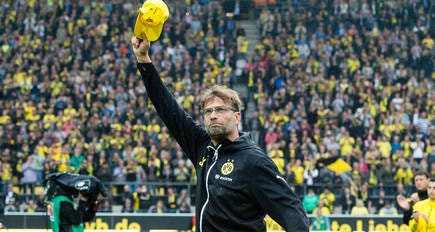Part 21 - A Quarter of a Century of Liverpool FC in the Premier League Era, 1992-2017
From Doubters to Believers..
We finally get to the departure of Brendan Rodgers and the arrival of Jürgen Klopp.
Originally written by TTT Subscriber Anthony Stanley, this major series was first serialised on The Tomkins Times and then published by TTT as a book, called A BANQUET WITHOUT WINE - A Quarter-Century of Liverpool FC in the Premier League Era.
Covering the period from the onset of the Premier League in 1992 to Klopp’s arrival in 2017, the book is available from https://www.amazon.co.uk/Banquet-Without-Wine-Quarter-Century-Liverpool/dp/1521850674. It remains a definitive matter of record of Liverpool FC during the period in question.
In October of 2014 – just as Brendan Rodgers’ Liverpool were beginning to wake up to the sobering reality that was post-Suárez and post-title charge – Borussia Dortmund, under the stewardship of Jürgen Klopp, were enduring their worst run of form since the enigmatic and charismatic manager had taken the helm. Five consecutive defeats saw the club plummet to seventeenth in the Bundesliga. As Elmar Nevelling wrote in his biography of Klopp, with prophetic echoes that would follow the German to England in the fullness of time:
“Time and again, Dortmund were finding themselves struggling to break down teams who were (successfully) attempting to stifle their tactics through parking the metaphorical bus in front of goal. Bayern and Borussia Mönchengladbach were almost the only teams not to attempt this, being confident that they could beat Dortmund their own way.”
Following years of rampant success, Klopp’s Dortmund were on a downward trajectory. Perhaps it was that Klopp’s shelf life as a manager of the side had been reached and breached, perhaps a counter to his tactics had been discovered by his rivals, perhaps losing the likes of Robert Lewandowski and Mario Götze to Bayern had been too difficult to recover from. Klopp himself blamed the severe injuries that struck his team that autumn; by November Nuri Sahin, İllkay Gündoğan, Jacub Błaszczykowski, Oliver Kirch and Marco Reus were all out for substantial periods. Though Dortmund would recover following the Hinrunde and winter break, by early April the former Bundesliga champions were languishing in tenth place.
On the 15th April, four days before one of the low points of Rodgers’ Liverpool career would unfold with that FA Cup semi-final defeat to Aston Villa, Borussia announced that there would be a press conference. Ever since die Schwarzgelben had hovered above the relegation zone, Dortmund’s CEO (and Klopp’s close personal friend), Hans-Joachim Watzke, had feared that the manager ‘well known for being emotional, would resign.’ These fears were about to be realised as a clearly affected Watzke faced the media and imparted the news that put most of the heavy hitting clubs in Europe on red alert:
“...following Jürgen Klopp’s initiative, we have conducted several intense conversations over the last few days and then reached the mutual decision that the path we have been travelling on for seven long years with unbelievable success will come to a conclusion at the end of the season.”
Dortmund’s Director of Football, Michael Zorc, was also present and waxed lyrical on the impact Klopp had had on the club as he claimed that “Over the last seven years we have written a modern football fairy tale, with Jürgen Klopp playing the main role. In 2008, we weren’t in good sporting condition, but you gave this club huge optimism.”
For his part, the departing manager stated, with typical honesty and earnestness, that he was “no longer the perfect manager for this extraordinary club, which deserves to be managed by the coach who is 100 percent perfect for it.”
The rest of this article is for Dynasty Subscribers only.
Keep reading with a 7-day free trial
Subscribe to Dynasty – The Tomkins Times to keep reading this post and get 7 days of free access to the full post archives.



